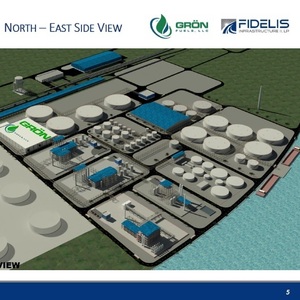Haldor Topsoe to supply technology to proposed Grön Fuels plant

SOURCE: Gron Fuels
December 29, 2020
BY Erin Krueger
Haldor Topsoe announced in December that Grön Fuels has selected its HydroFlex renewable fuels and H2bridge bio-hydrogen technologies with bio-carbon capture and storage (bio-CCS) option for its proposed $9.2 billion biorefinery in Louisiana.
Grön Fuels announced in November 2020 that it is studying the feasibility of development a renewable fuel complex at the Port of Greater Batton Rouge. The project would be built in stages over nine years. In the first phase of development, the facility would be able to produce 60,000 barrels per day of renewable diesel with an option to produce renewable jet fuel. A final investment decision is expected to be made in 2021, with the first phase of development complete in 2024.
Haldor Topsoe said its H2bridge hydrogen technology with the HydroFlex technology will allow the proposed facility to produce renewable bio-hydrogen equivalent to the production of a 1,000 megawatt (MW) hydrolyser plant at a fraction of the cost. Bio-hydrogen not utilized for renewable diesel production will be made available by Grön Fuels for purchase by third parties.
The proposed facility will produce renewable diesel from a variety of feedstocks, such as soybean and canola oils, distillers corn oil, tallow, used cooking oil and feedstocks of the future, such as bio-crudes. Topsoe said it worked with Grön Fuels to design the facility to be able to manufacture renewable arctic diesel with an additive-free cloud point of -40 degrees.
Advertisement
Haldor Topsoe also noted the option for bio-CCS would allow the facility to capture approximately 1 million tons of carbon dioxide annually for sequestration in deep saline aquifers located below the project site, enabling the production of carbon-negative fuel production.
A full copy of Haldor Topsoe’s announcement is available on the company’s website.
Advertisement
Related Stories
Marathon Petroleum Corp. on Aug. 5 released second quarter financial results, reporting improved EBITDA for its renewable diesel segment. The company primarily attributed the improvement to increased utilization and higher margins.
Chevron Corp. on Aug. 1 confirmed the company started production at the Geismar renewable diesel plant in Louisiana during the second quarter after completing work to expand plant capacity from 7,000 to 22,000 barrels per day.
The public comment period on the U.S. EPA’s proposed rule to set 2027 and 2027 RFS RVOs and revise RFS regulations closed Aug. 8. Biofuel groups have largely expressed support for the proposal but also outlined several ways to improve the rulemaking.
In celebration of World Biodiesel Day, MOL Group on Aug. 8 announced SAF was successfully produced for the first time at INA’s Rijeka Refinery during a pilot project to process biocomponent. Renewable diesel was also produced.
Iowa farmers have a new market opportunity for their 2025 soybean crop. Landus is expanding its Clean Fuel Regulation initiative, made possible by recent policy changes expected to increase Canada's demand for liquid biofuel.
Upcoming Events










